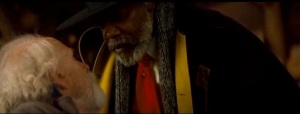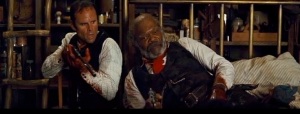 Tarantino doesn’t try to please social critics, and The Hateful Eight is his boldest effort of that in-your-face artistry. In some ways it’s my favorite of his. I love bottle dramas, slow burns, and murder mysteries, and when you put all this in a Tarantino stew, it’s hog-heaven. The film is basically Twelve Angry Men, except these men will do exactly what Juror #3 pretended on Juror #8 with the knife. They are despicable killers, trapped together in a roadhouse during a blizzard; only two are alive by the end, and even those two just barely. Some are calling it Tarantino’s most indulgent film, which it certainly is, but the indulgence works for rather than against. Some are also calling it his most political film, but that’s a supremely relative statement; this isn’t a political film.
Tarantino doesn’t try to please social critics, and The Hateful Eight is his boldest effort of that in-your-face artistry. In some ways it’s my favorite of his. I love bottle dramas, slow burns, and murder mysteries, and when you put all this in a Tarantino stew, it’s hog-heaven. The film is basically Twelve Angry Men, except these men will do exactly what Juror #3 pretended on Juror #8 with the knife. They are despicable killers, trapped together in a roadhouse during a blizzard; only two are alive by the end, and even those two just barely. Some are calling it Tarantino’s most indulgent film, which it certainly is, but the indulgence works for rather than against. Some are also calling it his most political film, but that’s a supremely relative statement; this isn’t a political film.
Nonetheless, there is implied commentary on race relations after the Civil War, and a wonderful use of the female lead as a blood-drenched punching bag. This may not be a film “about” racism and misogyny, but it has some fun working with the ideas. At a certain point there is a shift from a heavy deployment of the n-word to a vengeful use of the b-word, the subtext being that while men may be divided by racism, they can at least bond over a shared contempt of a woman. Daisy is the one character whose backstory remains elusive. We know she’s a killer and there’s a bounty on her head, but that’s it. What little we do learn is relayed by her captor John Ruth, and the other men in the roadhouse accept what he says with an air of indifference. Daisy doesn’t get a voice in anything spoken about her. She’s trivial, or at least rendered so through the perception of the men; in actuality she’s the reason for the whole mystery that explodes in a bloodbath.
 Long before that end game, we learn plenty about the men, especially the two pairs from opposite sides in the Civil War. Bruce Dern plays the crotchety old Confederate general. Walton Goggins plays the son of another Confederate legend, also steeped in southern values. Kurt Russell and Samuel Jackson are the two northern bounty hunters, and the closest thing The Hateful Eight has to offer as heroes. Russell plays the more traditional American hero (John Ruth), with a moral code that dictates he bring in his captives alive rather than dead, despite the dangers and personal inconveniences; yet he also dishes out extreme violence to his woman captive, Daisy. Samuel Jackson plays the rugged individualist hero (Marquis Warren) willing to do anything to survive. He’s a decorated soldier of the war, but forced to live in a world with white men (on both sides of the Mason-Dixon line) who regard him as his natural inferior. He carries around a personal letter to him from Abraham Lincoln, which he finally admits is a fake that he forged to impress white people — which Ruth takes as the ultimate betrayal and falls back on racist indictments: “I guess it’s true what they say about you people; you can’t trust a fucking word that comes out of your mouths.” Warren retorts with a speech about black people having to survive in a white man’s world, which they can only do by disarming white people, both literally and figuratively. His “Lincoln letter” had the latter effect — awing people by its proof that he’s a pen-pal of the American president — which is indeed precisely what enabled him to bond with Ruth in the first place.
Long before that end game, we learn plenty about the men, especially the two pairs from opposite sides in the Civil War. Bruce Dern plays the crotchety old Confederate general. Walton Goggins plays the son of another Confederate legend, also steeped in southern values. Kurt Russell and Samuel Jackson are the two northern bounty hunters, and the closest thing The Hateful Eight has to offer as heroes. Russell plays the more traditional American hero (John Ruth), with a moral code that dictates he bring in his captives alive rather than dead, despite the dangers and personal inconveniences; yet he also dishes out extreme violence to his woman captive, Daisy. Samuel Jackson plays the rugged individualist hero (Marquis Warren) willing to do anything to survive. He’s a decorated soldier of the war, but forced to live in a world with white men (on both sides of the Mason-Dixon line) who regard him as his natural inferior. He carries around a personal letter to him from Abraham Lincoln, which he finally admits is a fake that he forged to impress white people — which Ruth takes as the ultimate betrayal and falls back on racist indictments: “I guess it’s true what they say about you people; you can’t trust a fucking word that comes out of your mouths.” Warren retorts with a speech about black people having to survive in a white man’s world, which they can only do by disarming white people, both literally and figuratively. His “Lincoln letter” had the latter effect — awing people by its proof that he’s a pen-pal of the American president — which is indeed precisely what enabled him to bond with Ruth in the first place.
Right after that stirring speech comes a most ugly one, as Warren proceeds to explain to the old Confederate general what he did to his precious son: forced him to march naked in the freezing snow for hours, and then give Warren a blowjob. This comes in a long, drawn-out, mean-spirited delivery by Warren (if you really want to watch the outrageous scene, it’s here), and ends in the enraged general going for a gun, with Warren shooting him in self-defense.
 Then comes the intermission, and when we return, the film turns. As I said, the n-word suddenly takes a back-seat to the b-word, as the Daisy plot revs up. People die; an Agatha-Christie like murder mystery ensues; more people die. By the final chapter, blood, puke, and brains are sprayed everywhere, and Warren has bonded with the young Confederate against “the bitch who must die”. They recline on the bed together, bleeding like pigs, in a hilariously demented face-off against the remaining survivors in the roadhouse. For whatever reason, I was reminded of an All in the Family episode from 1973, in which Archie and Henry engage in their usual race wars, in this case the question of a black president. Suddenly they find themselves allies against Gloria and Louise over the question of a woman president. Here’s the clip:
Then comes the intermission, and when we return, the film turns. As I said, the n-word suddenly takes a back-seat to the b-word, as the Daisy plot revs up. People die; an Agatha-Christie like murder mystery ensues; more people die. By the final chapter, blood, puke, and brains are sprayed everywhere, and Warren has bonded with the young Confederate against “the bitch who must die”. They recline on the bed together, bleeding like pigs, in a hilariously demented face-off against the remaining survivors in the roadhouse. For whatever reason, I was reminded of an All in the Family episode from 1973, in which Archie and Henry engage in their usual race wars, in this case the question of a black president. Suddenly they find themselves allies against Gloria and Louise over the question of a woman president. Here’s the clip:
This was the sort of thing All in the Family did so well — shifting expectations, reversing allegiances, showing victims of bigotry to be bigots just as bad. (Side-note: this clip is fun to watch in light of contemporary politics, with our first black president on his way out, and the first likely woman waiting in the wings.)
The Hateful Eight is no mere social satire, any more than Inglourious Basterds is about the fetishizing of violence. Tarantino’s stories are too immersive to be nailed down that way. But it incorporates satire and suggests that none of us is terribly clean.
